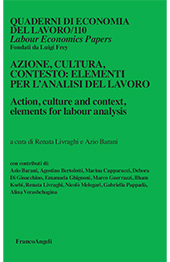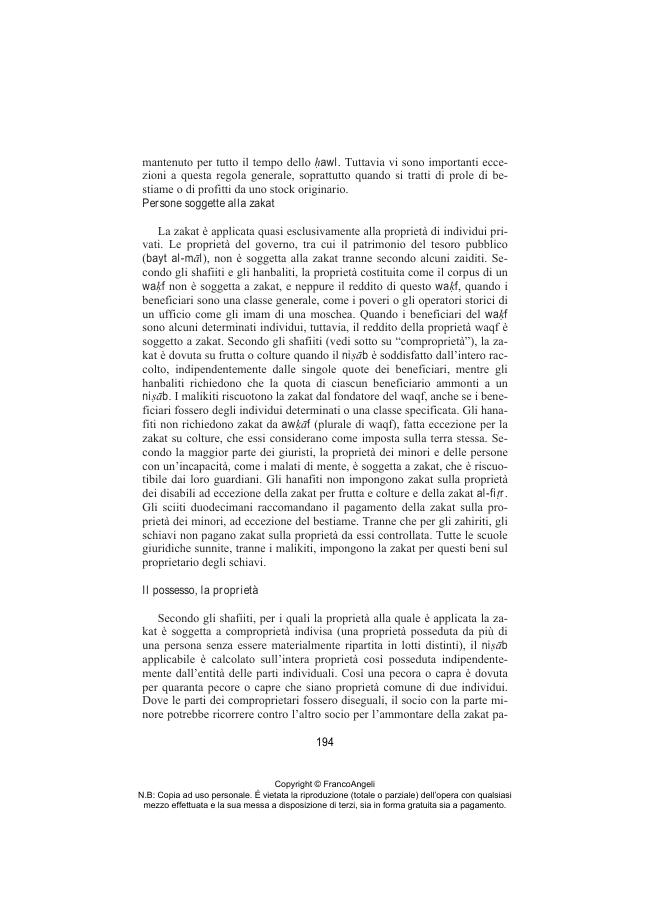La zakat islamica
183-205 p.
Questo saggio vorrebbe porre in risalto il fatto che a prescindere dagli scismi che hanno segnato la storia dei popoli Islamici e delle varie forme di governo nei paesi Musulmani, l'ideale di uno stato islamico fondato sulle regole del Corano rimane un ideale da perseguire e implementare dalle comunità Islamiche e dai singoli fedeli. La società che ha prodotto i principi, che regolano la riscossione delle tasse, stava espandendosi ben al di là dei confini dei territori tribali della Penisola Arabica.
Le conquiste militari e l'espansione conseguente, fecero insorgere, il problema della spartizione del bottino e della formazione di entità statali nei territori di recente conquista. La formazione di una potente base militare, prima a Kufa e più tardi a Raqqa, e l'attraversamento del fiume Amu Darya favorirono la formazione di sistemi amministrativi e fiscali per il califfato, che si stava espandendo con sempre nuove conquiste durante le tre decadi dei primi quattro califfi. Il califfato, dagli inizi dell'espansione Musulmana, assunse le caratteristiche dello stato islamico ideale, anche se sin dalla fine del periodo dei Rashidun la comunità Islamica aveva cessato di essere una realtà esclusivamente Araba.
Il califfo Omar creò il diwan per dare al califfato una stabilità finanziaria a lungo termine appropriandosi, in quanto autorità suprema della Umma, di larga parte del bottino ottenuto dalle conquiste. L'amministrazione califfale avrebbe agito per garantire il benessere generale della Umma. Nei territori conquistati i Musulmani rimasero a lungo una minoranza e tuttavia formarono la base per una lenta ma inesorabile islamizzazione e arabizzazione di moltitudini nel Medio Oriente, in Nord Africa e in Asia. Le regole elencate nell'articolo vorrebbero mostrare come i capi religiosi, quelli militari, i califfi e le entità che formarono servendosi delle regole coraniche e della loro interpretazione, furono universalmente comprese e accettate dai Musulmani nella loro relativa semplicità ed elementarità. [Testo dell'editore].
This appendix means to shed light on the fact that independently from the schisms that affected the history of Islamic people and state realities, the ideal of an Islamic state founded on the prescriptions of the Holy Qur'an remains an ideal to be pursued and implemented by Muslim communities and faithful.society that produced the principles regulating tax collection was expanding quite beyond the boundaries of tribal territories in the Arabian Peninsula. Military conquest and advance brought about the problem of booty division and the formation of states in the newly conquered territories.
The establishment of a powerful military base first in Kufa and later in Raqqa and the crossing of the Amu Darya (Oxus) called for the formation of fiscal and administrative foundations for the caliphate, ever expanding through new conquests during the three decades of the first four caliphs. The caliphate since the beginning of the Islamic expansion assumed the features of the ideal Muslim state, although by the end of the period of the four Rashidun the Islamic community had ceased to be an exclusively Arab reality. The caliph Omar established the diwan in view of the long-term financial stability of the caliphate that was based on the appropriation by the caliph of a large part of the booty obtained from the conquests.
The administration of the caliphate would have acted to guarantee the general welfare of the Umma. In the newly conquered territories for a long time the Muslims remained a minority of the local population, even though they formed the basis for a slow but inexorable islamization and Arabization of the multitudes in the Middle East, north Africa and Asia. The rules listed in the article are meant to show how the religious and military leaders, the caliphs, and the entity that they formed out of the Quranic rules and their interpretation were universally understood and accepted in their apparent straightforwardness and simplicity. [Publisher's text].
-
Articles from the same issue (available individually)
-
Information
ISSN: 1971-8470
KEYWORDS
- Sistema di tassazione dell'Islam, tassazione della ricchezza, benessere e redistribuzione, doveri religiosi, prassi della tassazione, califfato
- Islamic tax system, taxable assets, social-economic redistribution and welfare, religious obligation, taxation customs and practices, caliphate



